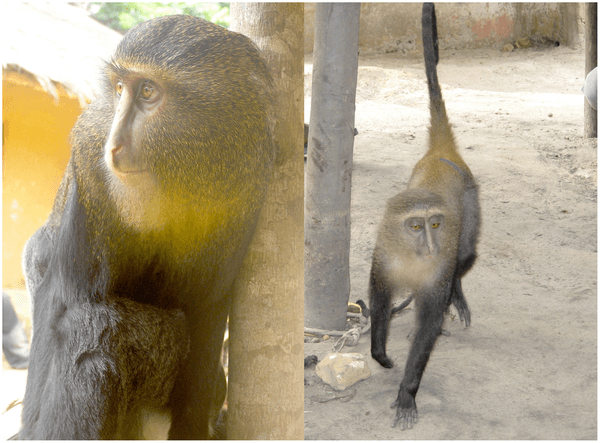Lesula, new monkey species, discovered in DR Congo
Examples of the newly identified lesula monkey in its native Democratic Republic of Congo.
Zoology just got one more entry under "Monkey": the cercopithecus lomamiensis, or lesula for short.
A team led by researchers from Yale University spotted the previously unidentified species in the rainforests of Lomami Basin, in central Democratic Republic of Congo.
According to their newly published paper in the Public Library of Science, it's only the second monkey species to be discovered in Africa in 28 years.
It was, however, well known to people living in the area: the naturists first encountered one of the monkeys at the house of a local primary school director, who was caring for the animal after its mother was killed.
The research team met other lesulas – as locals called the monkeys – living in captivity, and in December 2007 finally observed it in the wild.
"A mane of long grizzled blond hairs frames a protruding pale, naked face and muzzle, with a variably distinct cream colored vertical nose stripe," they write in their paper.
More from GlobalPost: The yellow-tailed woolly monkey: Peru's charismatic, endangered primate
The wide-eyed, pink-faced lesula has already won itself admirers. The Guardian's art critic, Jonathan Jones, compares the researchers' picture of the monkey to a Rembrandt portrait, cooing over its "staggeringly insightful, wise, and melancholy face" and "profound and tragic gaze."
CNN's frame of reference is a little less high-brow. Its commentators compared the lesula to, variously, Jake Gyllenhaal, Paris Hilton, the botched Jesus fresco, and David Schwimmer (now that one really is uncanny).
Neither article, however, mentions male lesulas' other distinctive feature: blue bottoms.
"An adult male exhibits a bright blue scrotum and perineum, which fade quickly upon death becoming creamy white in dried skins," according to researchers.
The lesulas and their bums need protection if they are to survive much longer, the scientists warn. With a range of just 6,500 square miles, according to the BBC, the species – already classified as vulnerable – could become seriously endangered unless it is kept safe from hunters and the destruction of its habitat.
